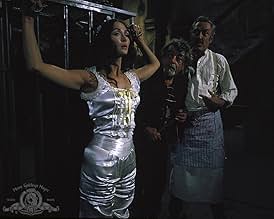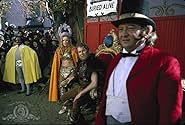Füge eine Handlung in deiner Sprache hinzuParis...at the turn of the century. Inspector Vidocq investigates a series of unexplained murders at a Grand Guignol-type theatre...where the players have suddenly become real-life victims. ... Alles lesenParis...at the turn of the century. Inspector Vidocq investigates a series of unexplained murders at a Grand Guignol-type theatre...where the players have suddenly become real-life victims. Based on the story by Edgar Allan Poe.Paris...at the turn of the century. Inspector Vidocq investigates a series of unexplained murders at a Grand Guignol-type theatre...where the players have suddenly become real-life victims. Based on the story by Edgar Allan Poe.
- Gabrielle
- (as Rosalind Elliott)
- Madam Adolphe
- (as Maria Martin)
- Member of Repertory Company
- (as Rafael Hernandez)
Now, for my thoughts on the film: despite an interesting 'revisionist' premise (with its various subtexts) - inspired by but not based on the Poe original - all in all, I found the film rather dull and Hessler's direction disappointingly lifeless, if pictorially valid (as we had come to expect of him by now). Still, one cannot really blame AIP for straying so far away from the main source: as Hessler himself says in the interview on the DVD, everybody already knew the ending to Poe's story - so it would not have 'worked' had they simply adapted this to the screen. Therefore, the writers had to reinvent the plot and the way they went about it, i.e. 'working' around Poe's very tale (as it's being presented at a Grand Guignol theater) was actually quite ingenious! Having said that, however, what kind of a story do you 'invent' that could center around the stage if not the old 'Phantom of the Opera' routine?! So, I guess, every 'revisionist' adaptation - however novel has a downside, too!
While I don't really see Vincent Price in either lead role, it's very much true that as it is - Herbert Lom was basically going through the paces (having been THE PHANTOM OF THE OPERA [1962] for Hammer), while Jason Robards' mind was clearly elsewhere. Truth be told, theirs was interesting casting, but I have a hunch it would have worked even better had the two roles been reversed (as Robards himself seems to have suggested during filming!). The rest of the cast Christine Kaufmann, Adolfo Celi, Michael Dunn and Lilli Palmer were up to their (mostly unassuming) tasks, if not particularly outstanding.
The dream sequences (rather cerebral for this type of film) drew attention to themselves, particularly through the use of slow motion - and they were certainly effective, if not exactly creepy. As I have already stated, the theatrical and period atmosphere was well captured, in spite of the low budget, though I never felt like I 'was' in Paris (maybe because I knew beforehand that it was actually filmed in Spain?)!
Not having watched the 'original' version, I don't know whether I would have actually liked this 'Director's Cut' more if I had which I did, by the way, but I somehow expected it to be better (maybe after the overwhelming positive response the recent discovery of this restored cut has generated?). I certainly don't think it holds a candle to Universal's flawed but fascinating 'Expressionist' version of 1932 (not very popular around these boards, I gather?) though in all fairness, it's not quite the same movie, so there you are!
- Bunuel1976
- 12. Okt. 2004
- Permalink
Handlung
WUSSTEST DU SCHON:
- WissenswertesStar Jason Robards thought he was miscast in this project.
- PatzerJust before a performance, Charron tells his wife to "break a leg." That very American expression originated in the 1920s, and thus certainly would not have been spoken in 19th-Century Paris.
- Zitate
Rene Marot: Yes, Madeleine. There stands the axe-man of your dreams.
- VerbindungenFeatured in Deadly Earnest's Nightmare Theatre: Murders in the Rue Morgue (1978)
Top-Auswahl
- How long is Murders in the Rue Morgue?Powered by Alexa
Details
Box Office
- Budget
- 700.000 $ (geschätzt)
Zu dieser Seite beitragen



































